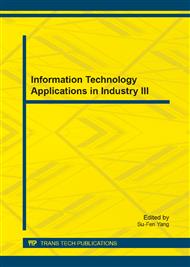p.350
p.354
p.362
p.367
p.373
p.378
p.383
p.387
p.395
An Improved Estimation of Distribution Algorithm for Dynamic Voltage Scaling Problem in Heterogeneous System
Abstract:
Energy consumption can be optimized by utilizing dynamic voltage scaling that conjointly adjusts the supply voltage and the operational frequency during the execution of the tasks to effectively minimize the energy. An improved estimation of distribution algorithm is presented for energy saving of the distributed embedded systems that consists of dynamic voltage scalable processing elements. The algorithm evolves computation by using the univariate marginal distribution to search the solution in a discrete space and mapping the solutions into feasible ones stratified the precedence constraint. The algorithm hybridize the genetic algorithm with estimation of distribution algorithm by combines statistically learning and sampling the probability distribution of the population iteratively and the conventional evolutionary operators such as crossover and mutation together. Simulated annealing is utilized to accept some bad solution rather the elite solution to make fully use of the global and local information. Experiments are implemented to demonstrate the performance of the algorithm
Info:
Periodical:
Pages:
373-377
Citation:
Online since:
September 2014
Authors:
Price:
Сopyright:
© 2014 Trans Tech Publications Ltd. All Rights Reserved
Share:
Citation:


